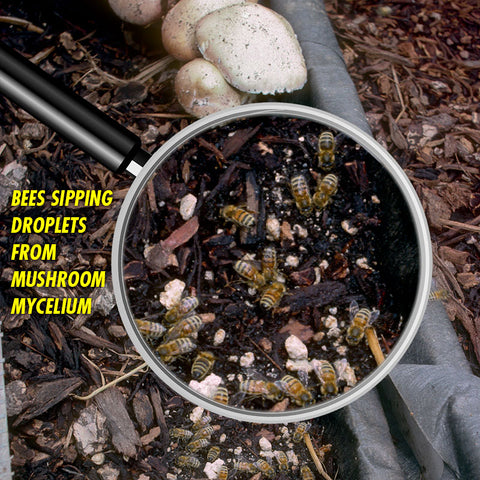
The Bee Friendly™ Research Initiative
What is Bee Friendly™?
BeeFriendly™ is an initiative from Host Defense and Fungi Perfecti to help reverse the devastating declines in the global bee population that are critically threatening the world’s food security.
Why do bees need help?
Since the initial detection of Colony Collapse Disorder (CCD) in 2006, honey bee keepers have been losing roughly 30% of their hives annually. Although CCD is not fully understood, it appears to be a destructive synergism of multiple drivers of collapse.
Drivers of Colony Decline
Microbial & Viral Pathogens
Apparently healthy bee colonies may be simultaneously infected by multiple pathogens that are normally held in check by the colony’s immunity. Pathogen infection harms bees already challenged by other stress factors.
Parasitic mites
Varroa mites are parasites that feed on the bodily fluids of bee adults, pupae and larvae. Varroa mites transmit viruses and sap strength from the colony.
Pesticides, Fungicides & GMO Exposure
Sub-lethal pesticide exposure can alter bee immunity, behavior, smell, memory, metabolism, flight and mobility, and increase susceptibility to diseases. Exposure to fungicides kills or reduces the beneficial fungi found on pollen, and degrades the nutritional quality of the “bread” that the bees make from it. More research is needed, though many suspect that GMOs may negatively impact bee colonies.
The synergistic stressors of infection, parasitism, toxins, and immune deficits/depression may initiate Colony Collapse Disorder (CCD).
The Bee Friendly Approach to Recovery

Immune Support
Researching the role that extracts of the mycelium of mushrooms can have in strengthening the immune systems of bees and reducing their viral burden.
Controlling Bee Parasites
Developing ways to use the common bio-control fungus Metarhizium anisopliae to control the parasitic mite Varroa destructor. Significantly, this fungus is safe for bees, birds and humans and appears to be highly active against Varroa mites.
Detoxification Support
The bee genome has relatively few detoxification genes compared to solitary insects such as flies and mosquitoes. Select mushroom species release myconutrients that may modulate and up-regulate detoxification pathways in bees.
BEE F R I E N D L Y™
The research-to-date has been made possible by the generous support of individuals, companies, and private foundations. Continued financial support of the WSU Honey Bee Research Laboratory makes this novel research possible. If you would like to contribute to this research, you can donate at beefriendlyinitiative.org.
And of course, your continued support of Fungi Perfecti allows us to reinvest into research efforts such as this. Many thanks to all of you who aid us in these endeavors!
To receive the latest information on this and other developments at Fungi Perfecti, sign up for our email newsletter at the bottom of this page.

